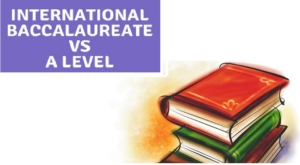A Levels
A Levels are known for developing in-depth subject knowledge and the English National Curriculum (of which A Levels are a part of) still remains the most popular curriculum choice with international schools around the world. Students usually choose three or four subjects, and take two years to study for these A-levels between the ages of 16 and 18. Pass grades are A* (the top grade), followed by A, B, C, D and E. One similarity between the IB Diploma and A Levels is that both qualifications are assessed by exams at the end of a two-year study period.
IB Diploma
The IB Diploma is for students aged 16-18 and requires no specific preparatory classwork, so can be undertaken directly from GCSEs. It offers a broad curriculum made up of six subject groups – students usually study three at a higher level and three at a standard level.
The six subject groups are Studies in Language and Literature, Language Acquisition, Individuals and Societies, Sciences, Mathematics, and the Arts. Each subject is graded on a scale of 1 (minimum) to 7 (maximum). To pass the IB Diploma requires a minimum score of 24 points (260 UCAS points), and the successful completion of the DP Core requirements which carry an additional 3 points. The maximum score achievable by any student is 45 points.
For those confused about the differences between the two, this basic comparison table below should help.
| A Level | IB Diploma |
| Students take three or four subjects. | Students choose six subjects. A maximum of four to be taken at higher level and the remainder at standard level. |
| Pupils are awarded an A*– E in each subject. | Students are graded from 7 to 1 in each of the six subjects plus an additional three marks from other aspects of the course making a total of 45 points available (equivalent to five A*s at A level). |
| Studied over two years with final examination taken at the end. | Studied over two years with final examination taken at the end. |
| Academically challenging and rigorous – enables a student to develop in-depth knowledge in a subject that interests them. | Demanding workload. Suitable for all-rounders as a broad range of subjects are covered. Compulsory parts of the course such as ‘Theory of Knowledge’ and ‘Creativity, Activity and Service’ (CAS) are also assessed as part of the course. |
Jon Wingfield, deputy head at Brighton College Bangkok explains that it can be frustrating for parents to listen to the perennial debate between the two curricula when both provide excellent opportunities for students.“Having worked in a school that offered both IB and A Level courses, the truth is that both A Levels and the IB Diploma are universally recognised, respected and – provided you are successful – equally likely to get you into the university of your choice, irrespective of which subject you may be applying to study and in which country you are looking to study it.
